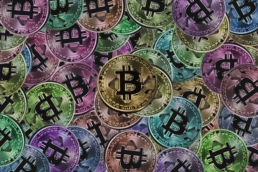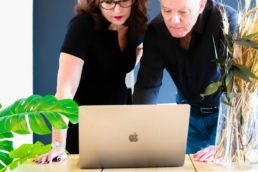Sanctuary 'sPLAINs: Spot Bitcoin ETFs
Last week the SEC approved spot Bitcoin ETFs (exchange traded funds). Crypto advocates have been clamoring for this ruling for a long time, and it’s a big deal because now anyone who’s interested in buying Bitcoin has easy access.
There has been a lot of media coverage, and some of you may have questions🤔. What does this mean for me individually? Should I invest? What if I already hold Bitcoin?
We’re going to cut through the noise and Sanctuary ‘sPLAIN this latest development in the ever-evolving world of cryptocurrency.

What is a Spot Bitcoin ETF?
First, it’s helpful to know that there are 2 types of Bitcoin ETFs:
- Derivatives-based ETFs
- Spot ETFs
Back in 2021 the SEC approved derivatives-based Bitcoin ETFs. Derivatives are complex financial instruments that derive (hence the name) their value from an underlying asset. For derivatives-based Bitcoin ETFs, the funds don’t own Bitcoin. They use derivatives that speculate on the future price of Bitcoin for exposure. So, buying one of these funds provides indirect exposure to Bitcoin – but you don’t technically own it.
Spot ETFs, which the SEC approved 1/10/24, own Bitcoin outright. If you buy one of these funds (and 11 different asset managers, including well-known asset managers Fidelity and BlackRock, were granted approval to offer them), you now own a fund that owns Bitcoin.
If you’re curious about the word “spot” – the spot price of a security is the current price.
The main difference between the old Bitcoin ETFs and the new Bitcoin ETFs are 1) the new ones actually hold Bitcoin and so 2) the value of the new funds reflects the real-time (or spot) price.
Why All the Fuss About ETFs?
Confession #1: I have never purchased any cryptocurrency. However, my understanding is that it’s not a simple, straightforward process. There are digital wallets. Special exchanges. Long strings of letters and numbers to be added to the blockchain which is the digital database that powers cryptocurrencies. Fees. Lots and lots of fees.
The beauty of an ETF is that it is simple for the end investor. You want Bitcoin? Congratulations! There are now 11 exchange-traded funds that buy and sell it, and if you buy one of those funds with a simple click of a button, you own Bitcoin. Easy peasy.
Why Did the SEC Cave?
While the SEC approved derivatives-based Bitcoin ETFs in 2021, they have resisted approving funds that actually own and trade Bitcoin. Reasons include the technical: the SEC argues that cryptocurrency is not a security and therefore not under its jurisdiction. And the philosophical: the SEC doesn’t want to give credence to cryptocurrency as crypto is widely used for money laundering, human trafficking, and other illegal, unethical activities.
However, last summer Grayscale, one of the largest crypto asset managers, sued the SEC after their proposal for a spot Bitcoin ETF was denied. The court found in Grayscale’s favor, and the ruling from the judges who presided over the case was unanimous: the SEC couldn’t approve futures-based Bitcoin ETFs and not seriously consider spot ETFs. It was too subjective.
The SEC’s hand was forced. Unless they wanted to drag this out in the courts, they had no choice. So last week they finally approved spot Bitcoin ETFs. However, an approval does not equal an endorsement and Gary Gensler, the Chairman of the SEC, had this to say about the decision:
“Though we’re merit neutral…Bitcoin is primarily a speculative, volatile asset that’s also used for illicit activity including ransomware, money laundering, sanction evasion, and terrorist financing. While we approved the listing and trading of certain spot Bitcoin ETP [exchange traded products] shares today, we did not approve or endorse Bitcoin. Investors should remain cautious about the myriad risks associated with bitcoin and products whose value is tied to crypto.”
Ouch.

So…Should I Buy Bitcoin?
Confession #2: Bitcoin is… fascinating. Especially when the price is going up and up and up. I recall the first time Bitcoin caught my eye. It was 2017… Bitcoin was in the midst of a price cycle that saw its value skyrocket from just over $4,000 to nearly $20,000 in less than 3 months🥳. Then, over the next year it lost ~ 80% of its value, and by the end of 2018 Bitcoin was worth less than $4,000😭. I promptly forgot about Bitcoin.
Fast forward to December 2020. Bitcoin was trading at close to $19,000 and it was back on my radar. Less than 3 months later it had TRIPLED in value – hitting $57,539 in February of 2021😲.
Bitcoin has had many of these “boom and bust” price cycles and they tend to garner media attention which can trigger a big sense of FOMO because it feels like everyone else is getting rich🤑🤑🤑 off crypto but you. At least – that’s how it feels for me.
However, FOMO is not exactly a practical framework for making investment decisions. A better framework is to ask yourself these 4 questions:
Question 1: Do I already hold it?
Do you already own Bitcoin? If so – what’s the reason for buying more now that it’s available via an ETF?
Question 2: Why should I expect a return?
This is where we can have a philosophical debate🧐, but the reality is cryptocurrency doesn’t produce anything, it doesn’t grow anything, and it doesn’t create anything. It is a series of numbers and letters on the blockchain and it’s only worth what someone else is willing to pay for it which means technically – despite media coverage to the contrary – there is no reason to expect a return.
In fact – while Bitcoin may have survived for over a decade, thousands of cryptocurrencies have failed. According to CoinGecko: of the over 24,000 cryptocurrencies listed on CoinGecko since 2014, 14,039 have died1.
Question 3: What are the costs?
First – let’s look at the actual costs: for the 11 spot Bitcoin ETFs – the fund costs range from 0.20% to 1.5% – which is a fairly large swing.
Second – while very well-established asset managers including Fidelity and BlackRock have chosen to offer spot Bitcoin ETFs – they are not immune from the inherent risks associated with owning and trading Bitcoin including:
- Volatility – we’ve already covered the boom/bust nature of Bitcoin price cycles. While doubling your money in 3 months is appealing, losing 80% of it over the next 12 months is not.
- Fraud – Crypto and fraud seem to go hand and hand. In 2021 there were 32 incidents of hacks and fraud totaling $2.99 BILLION. There have been major hacks like Ronin ($620 million stolen in 2022) and Mt. Gox (850,000 bitcoins worth $470 million at the time of the hack). Then there have been collapses of crypto exchanges – most notably FTX after founder Sam Bankman-Fried was arrested in December 2022. And of course the collateral damage – like the collapse of Three Arrows hedge fund after a bad bet on crypto. And I’ve barely scratched the surface.
Question 4: How does it align with my goals?
I think this is one of the most important questions you can ask. At the time I was considering Bitcoin, I would have answered the question “Why buy Bitcoin?” with “To make easy, fast money.” Using that as a lens, Bitcoin was nothing more than a modern-day lottery ticket. Financial Ozempic. Means to a desired end minus the time it takes to achieve them.
But I have a “WHY” behind my investments. My choices are guided by my Statement of Financial Purpose which is:
Money doesn’t grow on trees – it grows in markets – and I want the financial resources to live a rich and meaningful life, and to make the world a better place. I believe in people which means I believe in the power of human ingenuity and innovation to create continual opportunities that will allow my wealth to compound over time.
When I anchor to that, then a seemingly get-rich-quick scheme like Bitcoin has no place in my portfolio.
[Side note: we encourage you to use this 4-question framework for every investment decision you make. It’s not just for crypto!]

Final Thoughts
Interestingly – I was in the middle of reading Number Go Up: Inside Crypto’s Wild Ride and Staggering Fall, by Zeke Faux when spot Bitcoins ETFs were blessed into existence. I’ve since finished it, and if you have even the slightest curiosity about crypto – I highly recommend this book as it is an illuminating and entertaining read. I can think of no better way to wrap up this post, than to share Zeke’s conclusions at the end of the book which really resonated with me:
“It had been fourteen years since Satoshi Nakamoto mined the first Bitcoin. The technology was as old as WhatsApp or Uber, which had long since wormed their way into our everyday lives so thoroughly their names had become verbs. But no one had invented a mainstream use for cryptocurrency. So many smart people had spent so many thousands of hours working on crypto—and yet shockingly little of use had come of it… The idea of an instantaneous way of transferring money around the world was still appealing. But I’d tried out the fox-head icon, and the idea everyone would one day store their cash in some version of it was preposterous. Traveling around the world investigating crypto had given me a new appreciation for my Visa card. It worked instantly, with just a tap, charged no fees, and never asked me to memorize long strings of numbers, or to bury codes in my backyard. It even gave me airline miles. When my wife’s account was hacked and used to book an Airbnb, we were given a full refund with just a phone call.”
Spot Bitcoin ETFs are currently all the rage, but eventually, like all the many investment fads that have preceded them, they will move out of the limelight as the investing community turns its attention to the next, hot trend. In the meantime, the stock market continues to work for disciplined, patient investors who understand that building wealth happens incrementally, over time.
Please reach out to sarah@sanctuaryfp.com or jim@sanctuaryfp.com with your questions.
1 “Dead Coins: Over 50% of Cryptocurrencies Have Failed,” by Shaun Paul Lee, www.coingecko.com, January 15, 2024



